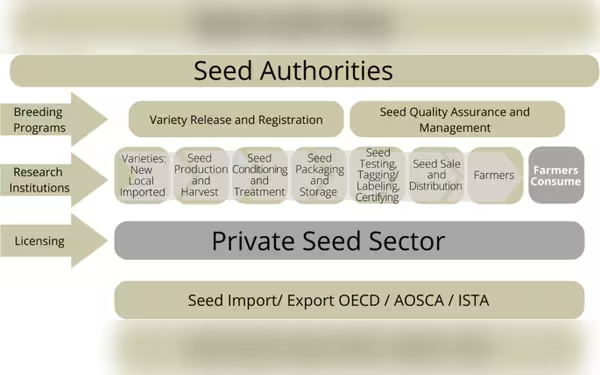Thursday, July 4, 2024 05:58 PM
Seed Business Regulation Committee Implements Stringent Quality Measures
- 80 companies approved as seed importers
- 17 processing units registered to enhance infrastructure
- Digital technology MIS introduced for seed certification
 Image Credits: SpringerLink
Image Credits: SpringerLinkThe Seed Business Regulation Committee enforces strict regulations, quality control, and digital technology to enhance seed industry efficiency and transparency.
The Seed Business Regulation Committee (SBRC) has recently made significant decisions regarding the regulation of seed-related activities for the fiscal year 2023-24. A total of 80 companies have been granted approval to operate as seed importers, while 11 companies have received registration certificates as Seed Exporters. Additionally, 17 processing units have been given the green light for registration, aiming to enhance seed-processing infrastructure in the industry.
Furthermore, 151 seed companies, comprising 145 local companies, 5 importers, and 1 exporter, have had their registrations renewed for a five-year period based on their satisfactory performance over the past three years. However, registrations for 89 companies operating as local seed producers have been revoked to ensure compliance with regulatory standards.
Stringent Quality Control Measures Implemented
The SBRC has implemented rigorous sampling and testing procedures to maintain the quality of seeds in the market. A total of 637.5 thousand metric tons of locally produced seeds and 46.6 thousand metric tons of imported seed shipments have undergone testing for purity, germination, and seed health to adhere to the Seed (Truth in Labeling) Rules established in 1991.
Enhancing Agricultural Output Through Variety Evaluation
The committee has conducted thorough evaluations, including Distinctness, Uniformity, and Stability (DUS) trials, for approximately 193 candidate lines across different crops. The Multiple Variety Evaluation Committee (VEC) has recommended varieties for cultivation to ensure diverse and high-quality agricultural output.
Introduction of Digital Technology for Certification Process
The introduction of a digital technology-based Management Information System (MIS) for seed certification aims to enhance efficiency, transparency, and accountability in the certification process. This system has facilitated the certification of over 1,300 varieties spanning more than 50 crops, providing real-time data for decision-making and improving stakeholder accessibility.
Conclusion
The recent decisions and initiatives by the Seed Business Regulation Committee signify a commitment to ensuring the quality and compliance of seeds in the market. By implementing stringent quality control measures, conducting thorough variety evaluations, and introducing digital technology for certification, the committee aims to enhance the overall efficiency and transparency of the seed business sector, ultimately benefiting stakeholders and consumers alike.













